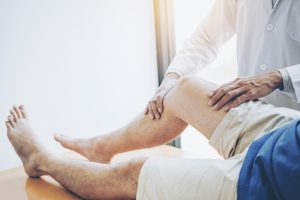Medial collateral ligament (MCL) injuries are common among athletes and active individuals. When these injuries are severe, surgery is often required to repair or reconstruct the damaged ligament. Physical therapy is critical to successful recovery and helping patients regain full knee function. At Twin Boro Physical Therapy in Princeton, NJ, we offer specialized rehabilitation programs designed to meet the unique needs of patients recovering from MCL surgery.
Understanding MCL Injuries and Surgery
 The MCL is located on the inner side of the knee. It connects the thighbone (femur) to the shinbone (tibia), providing stability by preventing knee bending too far inward. MCL injuries often occur due to direct blows to the outer side of the knee, which push the knee inward.
The MCL is located on the inner side of the knee. It connects the thighbone (femur) to the shinbone (tibia), providing stability by preventing knee bending too far inward. MCL injuries often occur due to direct blows to the outer side of the knee, which push the knee inward.
Types of MCL Injuries
- Grade 1: Mild sprain with slight stretching of the ligament.
- Grade 2: Moderate sprain with partial tearing of the ligament.
- Grade 3: Severe sprain with complete tear of the ligament.
When is MCL Surgery Necessary?
Surgery is usually recommended for Grade 3 MCL injuries or when there are additional injuries to other knee ligaments, such as the ACL. The goal of surgery is to repair or reconstruct the ligament to restore knee stability.
The Role of Physical Therapy After MCL Surgery
Physical therapy is essential after MCL surgery to ensure proper healing, restore knee function, and prevent future injuries. Twin Boro offers a comprehensive rehabilitation program tailored to each patient’s needs.
Pain and Swelling Management: Initially, techniques like ice therapy, elevation, and medications are used to manage pain and swelling, aiding early movement. These methods help reduce discomfort and facilitate the initial stages of recovery.
Early Mobility: Gentle range of motion exercises are introduced early to prevent stiffness and improve circulation. Maintaining joint flexibility and promoting healing are essential during this stage.
Strengthening Exercises: As recovery progresses, the focus shifts to strengthening the muscles around the knee. Exercises targeting the quadriceps, hamstrings, and calf muscles are performed using isometric exercises, resistance bands, and aquatic therapy to rebuild strength and support the knee joint.
Functional Training: Functional training involves gradual weight-bearing exercises and stationary cycling. These activities restore basic functional movements and improve knee stability, enabling patients to perform daily activities easily.
Advanced Strengthening: In the advanced stages of recovery, progressive resistance training, leg presses, and step exercises are introduced. These exercises enhance muscle strength and endurance, essential for a stable and functional knee.
Balance and Proprioception: Balance and proprioception exercises, using stability balls and balance boards, are incorporated to improve knee stability and coordination. These exercises are crucial for preventing falls and ensuring safe movement.
Sport-Specific Training: For patients returning to sports or dynamic activities, sport-specific training with plyometric exercises, agility drills, and tailored movements prepares the knee for the stresses of these activities. This training ensures the knee can handle the demands of sports and other high-intensity activities.
Return to Daily Activities: Functional exercises ensure patients can safely return to their daily routines and activities. The focus is on promoting long-term joint health and preventing future issues, enabling patients to lead an active and fulfilling life.
Let’s Work Together!
At Twin Boro Physical Therapy in Princeton, NJ, we offer personalized care tailored to each phase of MCL surgery recovery. Our comprehensive approach includes pain management, mobility exercises, strength building, balance training, and sport-specific preparation, ensuring optimal healing and function after knee surgery. Focusing on each patient’s unique needs, we help them return to their active lifestyles confidently and safely.
